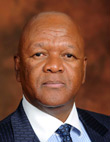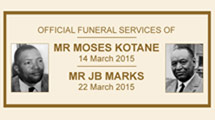By Minister Jeff Radebe
 The past few months have indeed been momentous for our country, marked by two significant events in its history. Two weeks ago, our country witnessed a significant moment when we brought back the remains of our two struggle veterans, JB Marks and Moses Kotane, from the foreign land where they lay for decades, to be reburied on home soil, where they can rest in eternity.
The past few months have indeed been momentous for our country, marked by two significant events in its history. Two weeks ago, our country witnessed a significant moment when we brought back the remains of our two struggle veterans, JB Marks and Moses Kotane, from the foreign land where they lay for decades, to be reburied on home soil, where they can rest in eternity.
Not so long ago, we brought back home the remains of veteran journalist Nat Nakasa, who was exhumed in New York and reburied in his home province of Kwazulu-Natal, where he was accorded a send-off befitting an icon of his stature. And as we grow into a mature democracy of over two decades, the memory and legacy of these stalwarts remain pivotal to telling our own stories and celebrating our heroes.
Moses Kotane died in 1978 and JB Marks in 1972. Both were buried in Novodevichy Cemetery in Moscow. Like the former fathers of our liberation struggle Nelson Mandela, Walter Sisulu, Oliver Tambo and others, stalwarts like Moses Kotane and JB Marks should be honoured for the sacrifices they made.
These two struggle icons we repatriated were the mentors of the generation of the former statesman President Nelson Mandela, which the world came to know. They were outstanding leaders of our people. It's through them that we saw the demise of apartheid. It's through their work that we saw the emergence of a system of equal rights, restoration of dignigty to our people and freedom.
As Chairman of the South African Communist Party (SACP) and a member of the National Executive Committee of the African National Congress (ANC), Marks played an indispensable role in helping to guide the liberation movement through one of its most difficult periods.
His conviction that the goal of liberation would triumph never flinched. Marks, like his comrades, was subjected to numerous and repeated bans and restrictions on his activities and movements. But he continued undeterred with underground activity, both in the ANC and in the SACP, of which he was elected Chairman at its fifth illegal conference in 1962. In a tribute delivered in 1972, then chairperson of the SACP Yusuf Dadoo described Marks, or “Uncle JB” as he was affectionately known, as “an outstanding internationalist”.
“As the Chairman of our Party, he ardently supported our unanimous policy; unity of the international Communist movement - the core of the worldwide struggle against imperialism and war, for national independence and peace. As a Marxist-Leninist, he firmly believed in the need at all times for the international working class to rally around the banner of the Union of Soviet Socialist Republics and the community of socialist States, the main force against imperialism and reaction,” he said.
Kotane, on the other hand, was a well-respected member of the struggle for majority rule in South Africa by even non-communist leaders. Walter Sisulu described him as a "giant of the struggle" because of his logical and non-dogmatic approach. Kotane was also a leading member of the African National Congress, at the same time as the SACP. He progressed so rapidly in his studies that the Party leadership decided to send him for further study to the Lenin School in Moscow, where his teachers included the great Ivan Potekhin, and the Hungarian Marxist Endre Sik.
Both Kotane and Marks deserve a posthumous hero's welcome to the land of their birth which has, owing to their sacrifice and lifelong commitment, achieved liberation and is still forging forward to be the society they both gave up their lives for. Like Nakasa, the return of their remains to South Africa comes at an opportune time when our country celebrates 20 years of freedom which they fought for. These icons championed the struggle for democracy in our country, on the African continent and even in Europe, where they met their demise.
These two men, at a great personal cost to themselves and their families, chose to fight freedom and democracy. They were agents of the society that they wanted to see in their lifetime. Today, they are remembered as heroes of our liberation struggle. The government believes their memory and legacy continues to sharply define the ideals and aspirations of the society we want to be. We believe that they will always remain inspirational figures, whose stories have the power to remind us of where we come from.
Both stalwarts will receive Special Official Funerals and President Jacob Zuma has instructed that the National Flag fly at half mast until the next Sunday evening. As South Africans, when the two are buried in their home soil in the weeks to come, we will trust and know that they are resting in peace, knowing that their struggle was not in vain - for South Africa is free today.
Jeff Radebe is Minister in The Presidency for Planning, Monitoring and Evaluation





